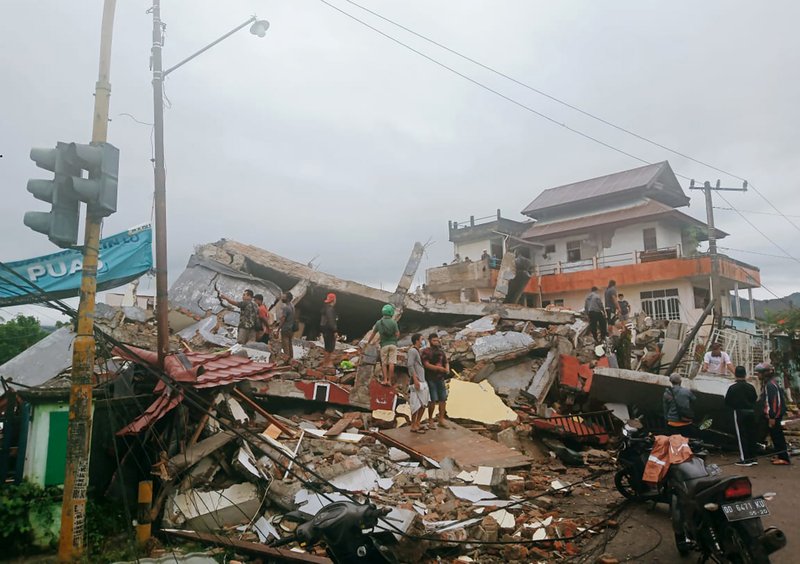A powerful earthquake rocked Indonesia’s Sulawesi island early Friday, killing at least 34 people, levelling a hospital and severely damaging other buildings, authorities said.
Hundreds more were injured when the 6.2-magnitude quake struck in the early hours, triggering panic among the terrified residents of the island, which was hit by a huge quake and tsunami two and a half years ago that killed thousands.
“The latest information we have is that 26 people are dead… in Mamuju city,” said Ali Rahman, head of the local disaster mitigation agency, adding “that number could grow”.
“Many of the dead are buried under rubble,” he said.
Separately, the national disaster agency said at least eight people had died in an area south of Mamuju, a city of some 110,000 in West Sulawesi province, bringing the total death toll to 34.
Rescuers were searching for more than a dozen patients and staff trapped beneath the rubble of the levelled Mamuju hospital.
“The hospital is flattened — it collapsed,” said Arianto from the rescue agency in Mamuju city, who like many Indonesians goes by one name.
“There are patients and hospital employees trapped under the rubble and we’re now trying to reach them,” he added, without giving a specific figure.
Rescuers were also trying to reach a family of eight trapped under the rubble of their destroyed home, he added.
The country’s search-and-rescue agency said at least one hotel had partially collapsed after the quake struck at 2:18 am local time Friday (1818 GMT Thursday), while the regional governor’s office also suffered extensive damage.
A Mamuju resident said damage across the city was severe.
“Roads are cracked and many buildings collapsed,” said 28-year-old Hendra, who also goes by one name.
“The quake was very strong… I woke up and ran away with my wife.”
Tsunami panic
Images from the scene showed residents fleeing the seaside city in cars and motorbikes as they drove past corrugated metal roofs and other building debris scattered on the roadside.
The meteorological agency warned residents that the area could be hit by strong aftershocks and to avoid the beachfront in case of a tsunami.
“The aftershocks could be as strong, or stronger, than this morning’s quake,” said Dwikorita Karnawati, chief of the meteorological agency.
“There is potential for a tsunami from subsequent aftershocks… Don’t wait for a tsunami first because they can happen very quickly,” she added.
But the warning threatened to spark more fear in the quake-jolted city.
“(Everyone) is panicking because authorities are saying there will be aftershocks that could cause a tsunami,” Mamuju resident Zulkifli Pagessa told AFP.
The city’s airport had also been damaged, authorities said.
The quake’s epicentre was 36 kilometres (22 miles) south of Mamuju and it had a relatively shallow depth of 18 kilometres, the United States Geological Survey said.
Images supplied by the search-and-rescue agency showed rescue workers checking on two sisters who were trapped under rubble. It was not clear where they were trapped.
Indonesia experiences frequent seismic and volcanic activity due to its position on the Pacific “Ring of Fire”, where tectonic plates collide.
In 2018, a 7.5-magnitude quake and a subsequent tsunami in Palu on Sulawesi left more than 4,300 people dead or missing.
On December 26, 2004, a 9.1-magnitude earthquake struck off the coast of Sumatra and triggered a tsunami that killed 220,000 throughout the region, including around 170,000 in Indonesia.
pps news




